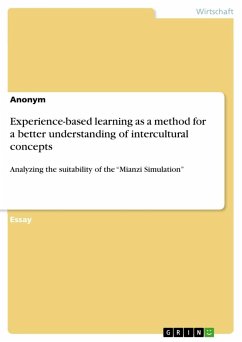
Time Concepts in Intercultural Business. India and Germany in Comparison

PAYBACK Punkte
0 °P sammeln!
Seminar paper from the year 2014 in the subject Business economics - Miscellaneous, grade: 1,3, http://www.uni-jena.de/ (Fachbereich Interkulturelle Wirtschaftskommunikation), course: Seminar Wirtschaftsbezogene Kulturgeschichte Indiens, language: English, abstract: Time is inseparably intertwined with our lives. We seldom stop to think about it because it appears to be a natural constant, which has always been and always will be. Most people are oblivious to the fact, that our perception of time and our ways to handle it are not uniform but culturally shaped. To say it with the words of the U...
Seminar paper from the year 2014 in the subject Business economics - Miscellaneous, grade: 1,3, http://www.uni-jena.de/ (Fachbereich Interkulturelle Wirtschaftskommunikation), course: Seminar Wirtschaftsbezogene Kulturgeschichte Indiens, language: English, abstract: Time is inseparably intertwined with our lives. We seldom stop to think about it because it appears to be a natural constant, which has always been and always will be. Most people are oblivious to the fact, that our perception of time and our ways to handle it are not uniform but culturally shaped. To say it with the words of the US-American anthropologist Edward T. Hall, who is one of the leading theoreticians in the field: "Time is a core system of cultural, social, and personal life. In fact, nothing occurs except in some kind of time frame. A complicating factor in intercultural relations is that each culture has its own time frames in which the patterns are unique. This means that to function effectively abroad it is just as necessary to learn the language of time as it is to learn the spoken language." (Hall 1983, p. 3). Consequently, different time frames might explain many misunderstandings in intercultural collaboration. Due to globalization, companies invest all around the world and it becomes more and more relevant for them to understand, why the attempt to implement their management approaches in culturally different contexts often fail. It is not enough to look at the surface only - time matters as well. Accordingly, Sahay emphasizes that taking time and space into account will lead to a more holistic understanding of implementation problems by going beyond the search for the elusive dependent variable that determines success or failure (Sahay 1998, p. 149). It is my ambition to strive for a deeper understanding as well. The underlying questions of this paper are: what kind of time related misunderstandings can occur in intercultural collaboration of Indians and Germans? And correspondingly, what do business people need to know about the time perception of the other to work together successfully? In order to answer these questions, I will use Hall's theoretical dimensions of polychronic and monochronic time. Investigating the applicability of this framework to India and Germany, I will try to locate both on a range from polychronic to monochronic time and analyze if typical misunderstandings occur. Finally, I will try to put these considerations into a greater context by discussing the question, if time concepts can be related to culturally different systems of thought. In doing so, I will refer to the theory of holistic vs. analytic cognition by Nisbett et al.













